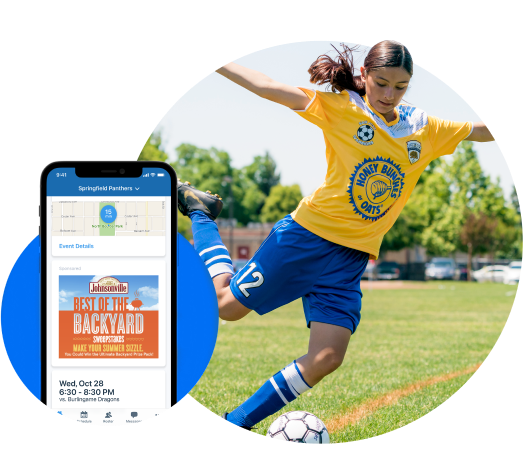Health Insurance Advertising Strategies To Reach Families
Build brand awareness and secure new policyholders with youth sports.
Learn More

Promote your health insurance brand to families with TeamSnap
TeamSnap empowers health insurance companies to create authentic relationships with families through youth sports sponsorships and digital media targeting families in the #1 youth sports coordination app. Unlike other marketing channels, we engage families when and where it matters most - at the field, at home, and on the go.
Learn how our partners including Kaiser Permanente, GoHealth Urgent Care, and One Medical use TeamSnap to reach the Chief Household Officer.
Learn MoreWhat is Health Insurance Advertising?
Health insurance advertising is a crucial aspect of marketing strategies for insurance companies. These advertisements serve the dual purpose of educating the public about available health insurance plans and building trust within the community. Health insurance organizations understand the importance of establishing credibility and reliability to attract and retain customers. Effective advertising campaigns help convey the benefits of their insurance plans, address common concerns, and highlight their commitment to customer well-being.
Health insurance advertising specifically refers to the promotional messages and campaigns designed to reach potential customers and persuade them to consider a particular health insurance plan or company. It often involves creating ads for various mediums like TV, digital platforms, print media, etc. Health insurance marketing essentially encompasses a broader range of activities aimed at promoting and selling health insurance products or services. It includes not only advertising, but also market research, product development, pricing strategies, distribution channels, customer relationship management, and overall brand positioning.
Health insurance advertising aims to create awareness, generate interest, and prompt action (such as requesting a quote or signing up for a plan) from potential customers. It focuses on short-term results like lead generation and immediate sales.
Health insurance marketing helps to build brand equity, establish trust and credibility, enhance customer satisfaction, foster loyalty, and ultimately drive sustained business growth and profitability.
3 Examples of Successful Health Insurance Advertising
Aetna's Community Outreach: Aetna's advertising campaigns often focus on community engagement. Aetna sponsors local youth sports teams and events, which not only promotes the brand but also demonstrates Aetna’s dedication to supporting local communities.
Blue Cross Blue Shield's Educational Campaigns: Blue Cross Blue Shield has run successful educational campaigns through various channels, like television commercials, educational events, digital advertising, and partnerships/collaborations. BCBS’s advertisements emphasize the importance of preventive care and regular health check-ups, positioning the brand as a reliable partner in maintaining good health.
Cigna's Digital Engagement: Cigna utilizes digital platforms effectively for targeted advertising. Cigna leverages social media, mobile apps, and personalized online content to reach potential customers and provide them with relevant information about their insurance products.
Exploring The Landscape of Digital Health Insurance Advertising
Health insurance advertising has expanded beyond traditional mediums like TV to include digital channels that offer precise targeting and measurable results. Companies like UnitedHealthcare and Humana have embraced digital health insurance advertising. Both brands utilize data-driven strategies to reach audiences interested in health and wellness, leveraging mobile apps like TeamSnap for targeted advertising to parents involved in youth sports activities.
The digital landscape in healthcare advertising is evolving rapidly, with advancements in AI-driven personalization, programmatic advertising, and interactive content. Marketers in the health insurance industry must stay updated with digital marketing and sponsorship trends to create impactful advertising campaigns that resonate with their target audience.
What To Know About Health Insurance Advertising
Advertising Cost: The cost of health insurance advertising varies based on the chosen channels and the scope of the campaign. Marketers should allocate budget strategically to maximize ROI.
Effective advertising requires compelling creatives that communicate the value proposition clearly. Visual elements, storytelling, and customer testimonials can enhance the impact of health insurance ads. Marketers should closely monitor industry trends such as telemedicine, wellness programs, and personalized healthcare services. Aligning advertising strategies with emerging trends can lead to more relevant and engaging campaigns.
______________________________________
In conclusion, health insurance advertising plays a pivotal role in connecting insurance providers with potential customers. By focusing on community engagement, leveraging digital platforms, and staying abreast of industry trends, marketers can create impactful advertising campaigns that drive customer engagement and loyalty.